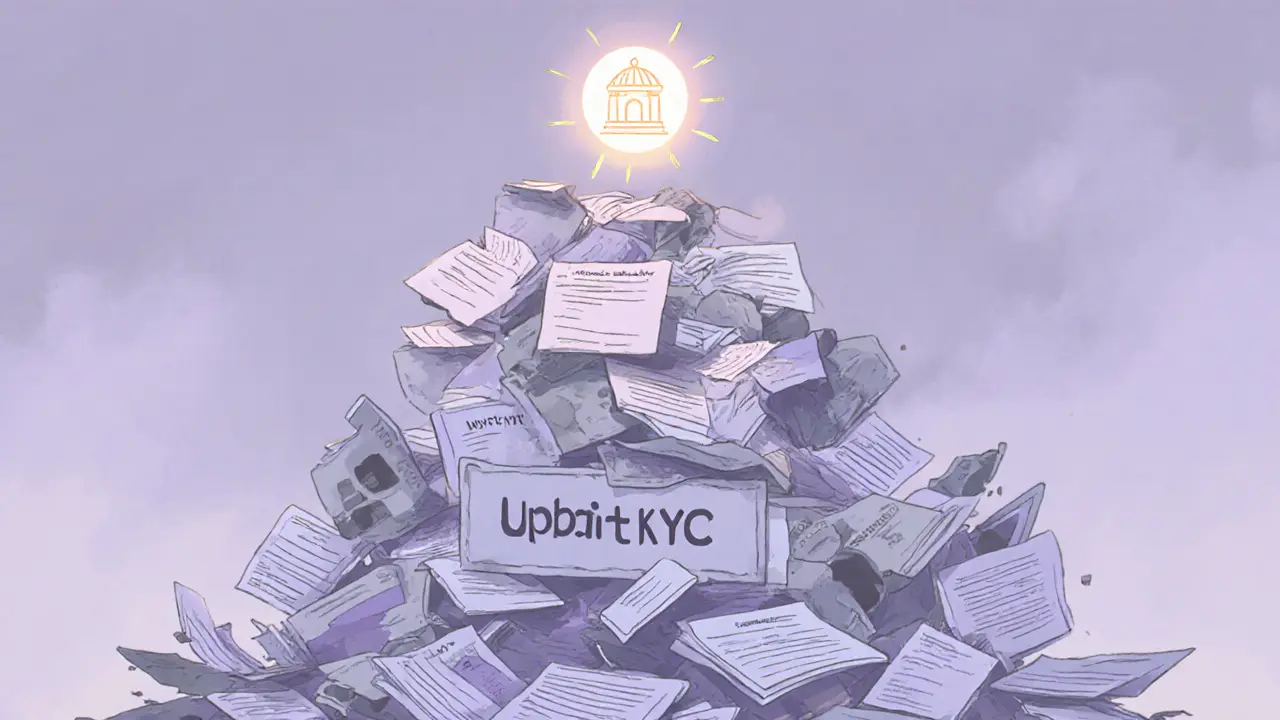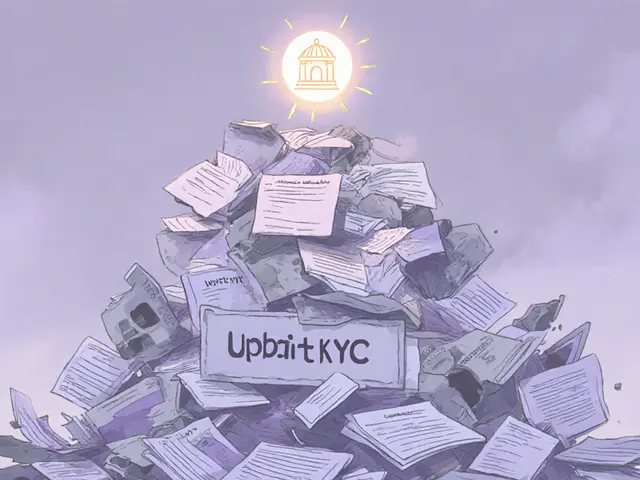Upbit KYC Violations: How 500,000 Compliance Failures Changed Crypto Regulation in South Korea

When South Korea’s Financial Services Commission (FSC) uncovered over 500,000 KYC violations at Upbit, it wasn’t just a paperwork problem-it was a system collapse. Upbit, the country’s biggest cryptocurrency exchange, handling 80% of all local trading volume, had been letting users sign up with photocopies of IDs, blurred driver’s licenses, and no verification at all. This wasn’t a few bad apples. This was the entire system failing, again and again, for years.
What Exactly Went Wrong?
The Financial Intelligence Unit (FIU) didn’t find one mistake. They found a pattern. Over 190,000 cases involved South Korean driver’s licenses that were never properly checked. The law requires exchanges to verify the encrypted serial number on each license, but Upbit skipped it entirely. They just looked at the name and photo. That’s like letting someone into a bank with a photo of a credit card instead of the real thing. Then there were the 9 million accounts where no ID was collected at all during re-verification. Users had been trading for months, sometimes years, with zero proof they were who they claimed to be. The system didn’t flag them. No alerts. No follow-ups. Just silence. Even worse, Upbit processed around 45,000 transactions linked to unregistered foreign exchanges. That’s a direct violation of Korea’s Special Financial Transactions Act. If you’re sending crypto to an exchange that’s not licensed in Korea, you’re supposed to be blocked. Upbit didn’t block them. They let it happen. These weren’t random errors. They were structural. The compliance team wasn’t just understaffed-they were ignored. The tech didn’t flag fake documents because the system wasn’t built to. The audits didn’t catch it because no one was looking hard enough.Why This Is Bigger Than Just Upbit
Most crypto exchanges get fined for a handful of violations. Binance paid $4.3 billion in 2023 for AML failures-but that was across years of global operations. Upbit’s 500,000 violations? All from one exchange, in one country, in a single audit. This is the largest single KYC compliance case in crypto history. No other exchange has ever had this many documented failures in one go. And it’s not just about money. It’s about trust. If the biggest exchange in South Korea can’t verify its users, what does that say about the rest? South Korea has over 30% of its adult population trading crypto. That’s millions of people. If even a fraction of those accounts were used for money laundering, the damage could ripple through the entire financial system. The government didn’t shut Upbit down because they couldn’t afford to. The market is too big. But they did something just as powerful: they froze new sign-ups for six months. That’s not a punishment. It’s a warning. To Upbit. To every other exchange. To every country watching.How Other Exchanges Are Reacting
After the news broke, Bithumb and Korbit saw a surge in new users. Traders in Seoul started moving their funds. Reddit threads filled with questions: “Is my money safe?” “Should I switch?” “What if they freeze withdrawals next?” Internationally, exchanges in Japan, Singapore, and the EU started reviewing their own KYC logs. Some began re-verifying old users. Others upgraded their document-checking software. One exchange in Hong Kong installed AI that cross-references ID photos with government databases in real time-something Upbit never had. Compliance costs are going up. Everywhere. Exchanges now need to keep digital records of every ID upload for at least five years. They need logs showing exactly when and how each document was reviewed. No more “we checked it manually.” That’s not enough anymore.
What Upbit Could Have Done Differently
This wasn’t inevitable. The tools existed. South Korea’s government already provided APIs for verifying driver’s licenses and national IDs. Upbit could’ve integrated them for less than $500,000. Instead, they saved money by using manual checks that were slow, inconsistent, and easily bypassed. They could’ve hired more compliance staff. They could’ve run quarterly internal audits. They could’ve tested their system with fake IDs to see what slipped through. But they didn’t. Why? Because growth was the only metric that mattered. More users. More trades. More revenue. Compliance was an afterthought. The FSC’s report didn’t just list violations. It listed missed opportunities. Every time a user uploaded a blurry photo and got approved, it was a choice. Upbit chose speed over safety. And now they’re paying for it.What Happens Next?
Upbit’s parent company, Dunamu, filed a lawsuit to challenge the suspension. They’re arguing the penalties are excessive. But the FSC isn’t backing down. The final decision is due by January 21, 2025. The most likely outcome? A fine-probably in the hundreds of millions of won-but not a shutdown. They’ll likely be forced to overhaul their entire compliance system under government supervision. The real change won’t come from the fine. It’ll come from the new rules. Starting in 2025, all Korean exchanges must use government-approved ID verification tools. No exceptions. No manual overrides. No photocopies. Every upload must be digitally validated. And every exchange must submit quarterly compliance reports to the FSC. This isn’t just about Upbit anymore. It’s about setting a new standard. If you want to operate in South Korea, you don’t just need a license. You need proof you’re doing the work.
What This Means for You
If you’re trading on Upbit: don’t panic. Your funds are still accessible. But start asking questions. Has the exchange upgraded its KYC? Are they using real-time verification? Are they transparent about their compliance status? If you’re using any exchange: check their regulatory standing. Look for public reports. See if they’ve ever been fined. Don’t assume big means safe. Big just means they’ve grown fast-and fast growth often hides sloppy compliance. If you’re building a crypto product: don’t cut corners on KYC. The cost of getting caught is no longer just a fine. It’s your reputation. It’s your license. It’s your business.What’s Next for Crypto Regulation?
South Korea is no longer playing catch-up. They’re setting the pace. The Upbit case proved regulators can audit at scale. They can dig into millions of records. They can find patterns no human would see. And they’re not afraid to act. Other countries are watching. The U.S. SEC, the EU’s MiCA framework, Japan’s FSA-they’re all taking notes. If a $8 billion daily exchange can fail this badly, what does that say about smaller ones? The message is clear: if you’re in crypto, compliance isn’t optional. It’s the price of admission.How many KYC violations did Upbit have?
South Korea’s Financial Intelligence Unit uncovered over 500,000 KYC violations at Upbit during a 2024 audit. These included cases where users submitted photocopies of IDs, unverified driver’s licenses, and no identification at all during re-verification. Nearly 190,000 violations involved unverified South Korean driver’s licenses, and over 9 million accounts had no official ID collected during re-checks.
What happened to Upbit after the violations were found?
The Financial Services Commission proposed a six-month suspension of new user registrations, but existing users can still trade and withdraw. Upbit’s parent company, Dunamu, filed a lawsuit to challenge the sanctions. Final penalties are expected to be decided by January 21, 2025, with fines likely but no full shutdown anticipated.
Is Upbit still operating?
Yes. Upbit is still fully operational for existing users. Trading, deposits, and withdrawals are all active. Only new account sign-ups are suspended while Upbit works to fix its compliance systems. The exchange remains the largest crypto platform in South Korea by trading volume.
Why did Upbit fail KYC checks so badly?
Upbit prioritized rapid user growth over compliance. They used manual verification methods instead of automated government-approved systems, accepted low-quality documents, and failed to verify critical details like encrypted serial numbers on driver’s licenses. Internal audits were either nonexistent or ignored, and compliance staff were under-resourced and under-supported.
What’s changed in South Korea’s crypto rules after this case?
Starting in 2025, all Korean crypto exchanges must use government-certified ID verification tools. Manual checks and photocopies are banned. Exchanges must digitally validate every document using official APIs and keep detailed logs for five years. Quarterly compliance reports are now mandatory, and failure to comply can result in license revocation.
Should I move my crypto from Upbit?
If your funds are currently safe and you’re not planning to open new accounts, there’s no immediate need to move. However, you should monitor Upbit’s compliance updates and consider diversifying across exchanges with stronger public compliance records. Many Korean traders have already moved portions of their holdings to Bithumb or international platforms like Kraken or Coinbase.







Upbit literally let people sign up with screenshots. That’s not negligence, that’s a joke.
I get why people are mad, but honestly? This is why I don’t trust any exchange that doesn’t have clear public compliance reports. It’s not just Upbit - it’s the whole ‘move fast and break things’ mentality backfiring. We need transparency, not just fines.
My buddy in Seoul just moved all his crypto to Kraken after this. Said he’d rather pay higher fees than risk his life savings on an exchange that can’t even check IDs properly. Honestly? Can’t blame him.
Oh wow, 500k violations? Guess that’s what happens when you let people trade crypto like it’s a TikTok challenge. 🙃
Let’s be real: this isn’t about ‘compliance’-it’s about regulatory capture. The FSC knew Upbit was cutting corners, but they let it slide until the market got too big to ignore. Now they’re using this as leverage to force standardization. Classic power play.
9 million unverified accounts? That’s not a glitch-that’s a systemic failure baked into the business model. Growth-at-all-costs. Profit-over-protocol. And now they’re surprised? Wake up. This was inevitable.
People act like this is unique, but it’s the same story everywhere: tech bros think rules are for other people. The blockchain was supposed to be free, but now we’re stuck with banks in hoodies. Irony? Or just capitalism?
They could’ve used the government API for $500k… but saved $2M by hiring 3 interns with Excel sheets 😭
I’ve been trading on Upbit since 2021. I never thought about their KYC process until now. It’s scary how easy it is to ignore the infrastructure behind the apps we use. We treat crypto like magic, but it’s just code-and code reflects human choices.
Honestly? I’m glad they froze new signups. Let them fix it. No rush. Better safe than sorry. I’d rather wait six months than have my wallet drained by a bot using a fake ID.
Korea’s always been too strict. If you can’t handle real money, don’t trade. Why are we babysitting adults? This is why crypto’s dying in the West-overregulation kills innovation.
500k violations? Bro that’s like 100k more than my ex’s lies… but at least she didn’t launder cash through crypto. 😭
My cousin works at a fintech startup in Seoul. They’re now hiring 50 new compliance officers overnight. Everyone’s scrambling. This isn’t just Upbit’s problem anymore-it’s the whole ecosystem’s wake-up call.
What’s being overlooked here is the metadata gap: no audit trails, no timestamped verification logs, no cryptographic binding of ID documents to user sessions. Without these, even automated systems are just theater. This isn’t a KYC failure-it’s an identity architecture failure.
They didn’t fail KYC. They failed humanity. You can’t outgrow your ethics. This isn’t about tech-it’s about character. And Upbit had none.
It’s interesting how this mirrors broader societal trends: the prioritization of convenience over accountability, speed over integrity. Crypto didn’t create this-it just amplified it. Perhaps the real lesson isn’t in regulation, but in the values we choose to build with.
I’m not surprised. I used Upbit back in 2020. They approved my ID in like 2 minutes. I uploaded a blurry photo of my license. No questions asked. I thought it was just fast service… now I realize it was a red flag wrapped in a ‘convenient’ bow.